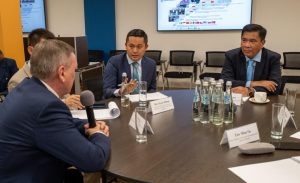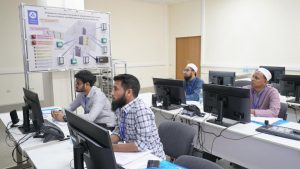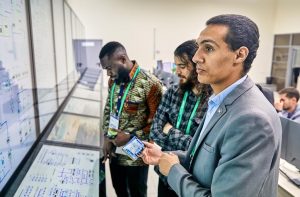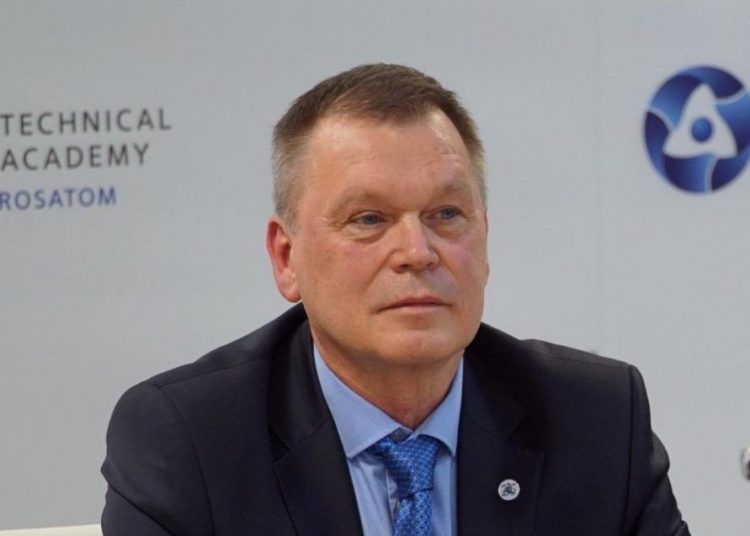Dwelling upon the global power transformations, the move towards cleaner power and the technological developments, Russia is spearheading the spread of nuclear power all over the world. The clear manifestation is ROSATOM’s portfolio of overseas orders which includes 33 power units in 10 countries, 22 of which are under construction.
Moreover, ROSATOM to build at least 17 more power units by 2035, including floating NPPs (Nuclear Power Plants), land-based SMRs (Small Modular Reactors) and commercial fast neutron reactors.
Accordingly, more than 350,000 qualified specialists will be needed to implement these projects in Russia and abroad by 2030.

Fulfilment of this scheme requires a transformation of the industry’s system of personnel training, thus raises many questions regarding the search for new technologies, regarding the processes and approaches in nuclear education and training.
Setting up such ambitious expansion plans, certainly couldn’t have been done without a vision that encompasses research, development, education and training.
Within the strategic perspective, Rosatom Technical Academy is geared up to propose a concept for the development of nuclear education. It has developed an intensive short-term development programme to provide training support for ROSATOM’s strategic projects. Such an investment will make the provision proactive personnel training possible in the upcoming activities of Rosatom.
Yuri Seleznev, Rector of Rosatom Technical Academy, says, “The basis of the training development scheme is an experience the Academy accumulated in the fields of safety of nuclear facilities training, training of personnel of foreign NPPs, educational support for international projects and new high-tech businesses of ROSATOM.”
Seleznev added that more than 26 thousand specialists were trained at Rosatom Technical Academy in 2023. The growing number of trainees every year assures him that Rosatom can support these plans.

Today, the Academy carries out complete training in the VVER technology. The development of the personnel training system for the Pilot Demonstration Energy Complex based on the BREST-300 reactor in Seversk (Russia) has become a new development stage for Rosatom.
The Academy will train personnel not only for big NPPs, but also for innovative reactors.
Today’s nuclear education and training are more focused on, incorporating simulation and virtual reality, artificial intelligence tools, online learning platforms, and on enhancing the culture of safety, the use of advanced analytics, seeking collaboration and sticking to international standards as well as managing regulatory changes.
The establishment of an integrated industry-wide centre for training of small nuclear power personnel for upgraded floating NPPs of the Northern Sea Route and land-based small power plants planned to be built in Yakutia, Norilsk and Myanmar could become a large-scale project of the current decade, according to Seleznev.
This is a project of ROSATOM’s beyond borders expansion, and it should certainly meet the requirements of an international centre.

In addition, Atomenergomash, the Mechanical Engineering Division of ROSATOM, is developing a project of an optimised floating NPP that can operate in hot weather countries. Unlike the American first small modular reactors project that was shut down due to high costs, things work in our country, he added.
Seleznev explains that the Academy created modern and efficient facilities to provide training activities and a system for training of the personnel of NPPs that ROSATOM constructs abroad. The Academy trains specialists of the plants under construction in Bangladesh, Turkey, Egypt, and Hungary.
At the same time, Rosatom is exploring the opportunities to build a system of proactive personnel training for the new nuclear power industry. “What is involved in building a new project? We need to follow the familiar path: people, facilities, training materials, simulators – everything has to be built from scratch. This is where heroic efforts never end. Nuclear power itself and the operation of a nuclear power plant is a quiet and confident job. But it originates in heroic efforts.”
Last December, Rosatom Technical Academy concluded a framework agreement with NovaWind JSC. Today, the regular interaction with the Wind Power Division is established and the training is provided. The cooperation with the Russian Association of Wind Power Industry allows Rosatom to assess the industry’s training needs and expands the range of training courses.
The Academy presented its training services for the new markets at this year’s International Wind Energy Forum dedicated to the renewable energy and electric transport. “The system of personnel training for a new promising area, industrial waste treatment and utilisation, is also being developed from scratch,” said Seleznev.
Founded in 1967 in Russia’s first “science city” of Obninsk – the cradle of Russia’s nuclear energy industry, Rosatom Technical Academy today works along with the IAEA’s to assist newcomer countries. “African countries are now showing great interest in the development of peaceful nuclear technologies. On the side-lines of the Second Summit and Russia–Africa Economic and Humanitarian Forum, held in Saint Petersburg last year
ROSATOM signed five agreements with African partners aimed at recognition and implementation of nuclear technologies and training of personnel.” A youth forum “Nuclear Education – Potential for Successful Regional Development” organized by the Rosatom Technical Academy together with the Peoples’ Friendship University of Russia during the Russia–Africa Summit, brought together more than 350 young specialists from Russia and African countries. It is yet another example of emerging interest Africa shows towards nuclear industry.
The nuclear energy field is new to African countries, and in order to build it, nuclear infrastructure needs to be developed first and foremost. This involves cooperation in the area of training and human capacity building. Rosatom Technical Academy has extensive experience in training activities: since 2010, about 3,300 specialists from 88 new countries have been trained at joint Russian and IAEA courses in various areas of nuclear energy use.
“By helping newcomer countries to develop their own university programmes in nuclear education and creating the courses on building nuclear infrastructure, we are laying the foundation for relations between Russia and African countries in the area of nuclear energy development on the neighbouring continent,” speaker concluded.






Discussion about this post